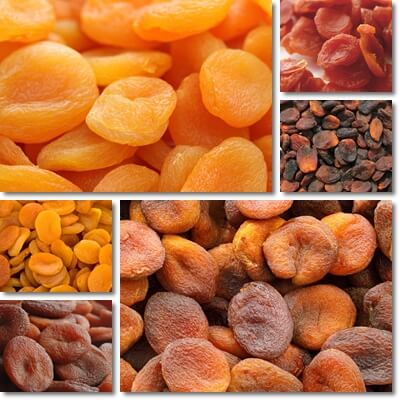GERD and fruit don’t always get along well. There are plenty of fruit that are bad for acid reflux, such as lemons, lime, blood lime, yuzu and other citrus fruit, but also tomatoes and pineapple even. There are also plenty of fruit that are good for acid reflux, in the sense that they do not elicit symptoms or cause a flareup when consumed reasonably. For example berries such as raspberries, blackberries or blueberries, but also quinces, pears, mulberries, peaches, nectarines and apricots are usually OK to eat with GERD.
Some fruits you can eat both fresh and dried if you have acid reflux, such as apricots.
But just how good are dry fruits such as dried apricots for acid reflux?
Fruit for acid reflux?
Some fruit are just bad for acid reflux. Acidic fruits in general are known GERD triggers. Fruit such as lemons, and lemon juice, are naturally high in organic acids which irritate the stomach lining, bringing about acid reflux. But fruit that are naturally low in organic acids such as apricots are good to eat with acid reflux. Both fresh and dried apricots are low acidic which makes them relatively safe in acid reflux, in moderation of course. So if you have GERD with frequent acid reflux episodes and are wondering what fruit you can eat without triggering your symptoms, then you may consider fresh, cooked and also dried apricots.
Find out more about fresh apricots for acid reflux.

Dried apricots for acid reflux
Dried apricots are sweet, chewy and bright colored, characteristics that make them a favorite dried fruit option. Naturally low in organic acids, they don’t typically irritate the stomach lining and don’t cause acid reflux. Despite their high fiber content of 7 g of dietary fiber per 100 g, dried apricots are easy on the stomach, partly because of their fiber profile.
Dried apricots are a source of soluble and fermentable fibers such as pectin (around 1% of total fruit weight, concentrated in the skin) – pectin has gelling and prebiotic properties and, compared to rougher, non-digestible fibers, it makes the fruit easy to digest. So long as they are naturally dried, without additives or preservatives, and consumed in reasonable amounts, dried apricots are not just a safe food to eat with GERD, but also good for the condition in the sense that they do not trigger acid reflux.
But dried apricots do not provide benefits specifically for GERD. Eating dried apricots is not a cure for acid reflux and does not actively combat acid reflux. At most, the dried fruit is not a trigger-food which is enough to make it good to eat for acid reflux. However, not all dried apricots are equally healthy or good to eat. For example, natural unsulphured dried apricots are a far better choice than sulphured apricots for GERD and acid reflux because they are more natural.
Sulfured vs unsulfured dried apricots
What’s the difference between sulfured and unsulfured dried apricot fruit? Unsulfured dried apricots are dry apricots without sulfur dioxide or other sulfites. Vs sulfured dried apricots which contain sulfur dioxide or other sulfites. Unsulfured dried apricots are more natural, and generally considered the healthier choice.
Sulfur dioxide is a common preservative for dried fruits, including apricots, apples, raisins, peaches, coconut flakes etc. But sulfur dioxide and other sulfites can cause digestive side effects and other more serious adverse reactions in some people, including allergic reactions and anaphylactic shock. It is not currently known if sulfur dioxide or other sulfites in dry fruits such as dried apricots can cause acid reflux or how much sulfured dried fruit you can eat with GERD safely. B
ut it’s a good idea to choose the more natural unsulfured dried apricots vs sulfured if you have GERD, to reduce the chances of experiencing a flareup in your condition, and because they are the overall healthier option.

Side effects of sulfites may include alterations in normal gut microbiota (gut bacteria and other microorganisms) and associated symptoms such as changes in bowel regularity and ability to digest certain foods, bloating, gas, hiccups, loose stools, and headaches, migraines, sneezing, rashes, throat itching or swelling, itching in the mouth, difficulty breathing and, in cases of allergy to sulfites, anaphylactic shock. In the amounts they are meant to be consumed, sulfured dried apricots shouldn’t elicit significant digestive side effects in a healthy person, but if your acid reflux is acting up, you can switch to unsulfured dried apricots to see if there are any improvements.
What color should natural dried apricots be?
There is a significant difference in color between unsulfured and sulfured dried fruits, especially apricots. Natural unsulfured dried apricots are usually a dark reddish brown color, vs sulfured dried apricots which are a beautiful, bright golden yellow-orange color. Sulfur dioxide and other sulfites are used not just as preservatives, to increase the shelf life of dried fruits and prevent rotting and spoilage, but also to enhance color. If you were to dry apricots naturally, they would lose their bright golden yellow-orange color as a result of oxidation (similar to how apples turn brown once you take a bite out of them). But by adding sulfur dioxide, the original color is not only maintained, but also enhanced which makes for an extremely visually appealing food product. The same is true for peaches, kiwifruit, ginger, some raisin varieties and other popular dried fruits. The rule of thumb is: the brighter and lighter-colored the apricots, the more sulfur dioxide they contain.
How many dried apricots equal a fresh apricot?
Depending on the cultivar and size of the fruit, there are chopped dried apricots, whole dried apricots and dried apricot halves available for sale. For dried apricot halves, 2 halves equal one fresh fruit. For whole dried apricots, one piece equals one fresh fruit. The rule of thumb is: eat as many dried apricots as you would fresh, so the equivalent amount of the fresh fruit. Or stick to the recommended portion size printed on the label, although eating just a little more than that (not the whole bag though) might not cause any adverse reactions in people with moderate acid reflux.
Other benefits
In addition to not being a trigger food for GERD and not actively causing acid reflux episodes, dried apricots provide other benefits too. They are high in potassium and a good source of magnesium for better blood pressure numbers. In the digestive tract, pectin and other types of dietary fiber from dried apricots bind to dietary cholesterol and fat, reducing absorption and actively supporting cardiovascular health.
Source of both soluble and insoluble dietary fiber, dried apricots are satiating and filling, helping you feel full faster and for longer. Not only do they usually not have any added sugars, but they also slow down the absorption of the sugar glucose in the blood which holds benefits for blood sugar metabolism. Dried apricots are especially good for eyesight and a source of benefits for skin health, as well as help bind loose stools and combat diarrhea, and relieve constipation.
